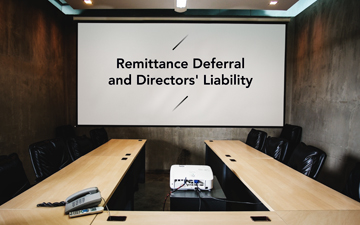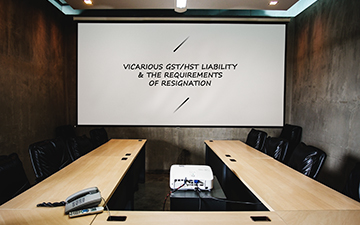Will CRA pursue directors for deferred GST/HST?

Directors should take steps to maximize their ability to successfully invoke the due diligence defence in regards to GST/HST remittance deferral
 |
Left to right: Michael Friedman, Adam Gotfried, Michel M. Ranger and Jamie Wilks of McMillan LLP. |
TORONTO – One of the many measures that the Federal Government has taken to protect employment and ease cash-flow crunches during the ongoing Coronavirus pandemic is to allow businesses to defer, until June 30, 2020, the remittance of net GST/HST amounts (collectible/collected minus input tax credits generally) (the "Remittance Deferral") that became owing between March 27, 2020 and the end of May 2020 (the "Deferral Period").
While the Remittance Deferral has undoubtedly helped many Canadian businesses, the Federal Government has not (yet) clarified the consequences if a business is unable to remit GST/HST amounts owing after the Deferral Period expires, or is only able to remit one of (i) net GST/HST owing arising during the Deferral Period, and (ii) net GST/HST owing arising after the Deferral Period. Clarity on this point would be particularly welcome since the directors of a corporation can, in certain circumstances, be held personally liable for the corporation's failure to remit net taxes to the Canada Revenue Agency (the "CRA").
This Bulletin supplements McMillan's original analysis of the Remittance Deferral, which was first announced in March, 2020. McMillan's analysis of the Remittance Deferral is available here.
Personal Liability of Directors for Net GST/HST Owing
Pursuant to subsection 323(1) of the Excise Tax Act (Canada) (the "ETA"), directors of a corporation are jointly and severally liable with the corporation for any net GST/HST that the company fails to remit to the CRA. However, the ETA absolves directors of personal liability under certain, specified circumstances. For example, the CRA cannot assess a former director, in respect of a corporation's failure to remit net GST/HST amounts, more than two years after the person ceased to be a director,1 and the CRA must take steps to try to collect the amount (or any portion of it) from the corporation before assessing a director personally.2
Even if the CRA assesses a director or a former director within the permitted time -period, and has unsuccessfully sought to collect unremitted net GST/HST amounts from a corporation directly, a director's liability for unremitted net GST/HST amounts is still not absolute. In order to preclude personal liability, directors can plead a defence of due diligence.
The Due Diligence Defence
Subsection 323(3) of the ETA contains the due diligence defence to director's liability. The law places the onus of establishing the defence of due diligence on the directors. A director must show that he or she exercised the degree of care, diligence, and skill to prevent the failure to remit net taxes that a reasonably prudent person would have exercised in comparable circumstances.
The Courts have repeatedly stated that directors of corporations in financial difficulty cannot use GST/HST amounts collected to satisfy non-CRA creditors in the hopes that the corporation's financial condition improves such that net taxes can eventually be remitted to the CRA. Indeed, the Federal Court of Appeal recently stated that this mischief is exactly what section 323 of the ETA3 aims to prevent, and that the due diligence defence was not available in such circumstances.4 The Court confirmed that the due diligence defence is focussed on the steps that a director takes to prevent a failure to remit on time, not the steps a director takes later to correct the previous failure to remit.
The Remittance Deferral and Directors' Liability
To date, the CRA has not provided any guidance on whether it will seek to hold directors personally liable for the Remittance Deferral of net taxes during the Deferral Period where the net taxes are not ultimately remitted5 after the Deferral Period expires. Such clarity is desperately needed because there is a divergence between the purpose of the Remittance Deferral (allowing Canadian businesses to use GST/HST collected, and to defer net tax remittances, to free up financial resources to pay employees and continue operations) and the purpose of section 323 of the ETA (to prevent directors from allowing corporations to use GST/HST collected and deferring net tax liabilities to pay employees and finance their operations). Part of the logic for the Remittance Deferral is that at least a portion of the net taxes that would have to be remitted in the Deferral Period, in the absence of the Remittance Deferral, would not yet have even been collected from customers.
If the CRA were to seek to assess any Remittance Deferral, it is unclear how section 323 of the ETA would apply, and what approach the CRA would or should take. Would the due diligence exercised by directors to prevent (not cure afterward) late remittances need to be established at the time that the net tax remittances became due under the ETA within the Deferral Period, or when they actually become due, at the end of the Deferral Period, under the CRA's administrative relief? The jurisprudence confirms that what happens after the net tax remittance is due under the ETA is irrelevant. Only the director's conduct up to that point in time is relevant. In the context of the Remittance Deferral approved by CRA, that approach contemplated under the law does not make sense.
Ideally, the CRA will simply not apply section 323 of the ETA in respect of net taxes deferred during the Deferral Period and not ultimately remitted after the Deferral Period. This approach would be logical, given that directors were tacitly encouraged, at the very least, by the Remittance Deferral to not remit net taxes owing during the Deferral Period and use those amounts to pay employees and creditors.
To date, the CRA has made no such statement.6
Protective "Due Diligence" and Other Measures for Directors to Take
In the absence of a CRA statement absolving directors from personal liability relating to Remittance Deferrals, and taking into account that the Federal Government's and the CRA's attention will eventually shift to recouping amounts spent during this pandemic, directors should take steps to maximize their ability to successfully invoke the due diligence defence in case needed.
However, the divergence between the purposes of section 323 of the ETA and the Remittance Deferral renders any potential application of the due diligence defence with respect to GST/HST amounts not remitted during the Deferral Period problematic. The question becomes: what steps should directors take?
In the CRA's Information Circular 89 2R3, Director's Liability, (the "Circular"), the CRA discusses the due diligence defence to directors' liability.7 The CRA mentions the following three particular actions that directors can take to potentially avail themselves of the due diligence defence
(i) Ensure that the corporation has established a separate account for withholdings (a "Withholdings Account") that will need to be remitted, including GST/HST collected;
(ii) Call upon the financial officers of the corporation to regularly report on the status of the Withholdings Account; and
(iii) Regularly obtain confirmation that withholdings, remittances and/or payments have, in fact, been made.8
Ideally, directors should ensure that corporations take each of the three actions above, if such processes were not in place before the pandemic. However, that conflicts with the purpose of the Remittance Deferrals in the first place.
In the absence of other guidance, corporations and directors should assume that GST/HST remittances in respect of reporting periods after the Deferral Period expires must be made on time, and that the CRA will rely on section 323 of the ETA if such remittances are not made.
Additionally, directors should ensure that their corporation has a plan to catch-up on GST/HST remittances not made during the Deferral Period (a "GST/HST Shortfall"), other than simply being three months in arrears with respect to GST/HST remittances in perpetuity. The corporation should have plans to remit, in respect of each GST/HST reporting period, the net tax actually remittable in respect of that period (if any), and all or a portion of any GST/HST Shortfall. The amount of any GST/HST Shortfall to be remitted in respect of any particular reporting period should be determinable based on some measure of the corporation's performance. This way, if the CRA later conducts an audit or asks about GST/HST Shortfall remittances, corporations (and their directors) can present their detailed plans on how to catch up on remitting the GST/HST Shortfall and cogent explanations, based on the corporation's performance, for why a GST/HST Shortfall persists. Note that, to the extent a corporation has a large, net tax refund to claim on a return,9 that refund may be used to offset net GST/HST liabilities owing in respect of the Deferral Period.
Directors should also be calling on the corporation's financial officers to develop these plans and projections now, and evidence of such communications with financial officers should be retained. This way, directors will be able to demonstrate that they were aware of the corporation's obligations to make up any GST/HST Shortfall, and that they were actively planning to remedy the failure to remit during the Remittance Deferral and prevent failures from arising after the expiry of the Deferral Period.
Certain directors may also wish to resign their position in order to start the two-year limitation period for the CRA to assess them personally with respect to a corporation's failure to remit net GST/HST. This option may be particularly attractive for outside directors with little or no control over the corporation's operations. Such directors should review the statute under which the corporation is governed to ensure that they correctly resign their position.10 Directors who have validly resigned at law should not continue to act as de facto directors of the corporation, or they could still face personal liability for unremitted net GST/HST amounts owing.11
Michael Friedman is a tax partner and Co-Chair of the McMillan LLP Tax Group; Adam Gotfried is tax litigation counsel in the Toronto office of McMillan LLP; Michel M. Ranger is a tax partner in the Montreal office of McMillan LLP; and Jamie Wilks is a commodity tax, customs and international trade lawyer in the Toronto office of McMillan LLP.
Footnotes
1. Subsection 323(5) of the ETA.
2. Subsection 323(2) of the ETA.
3. And similar provisions in the (i) Income Tax Act, (ii) Air Travellers Security Charge Act, (iii), Excise Act, 2001, and (iv) Softwood Lumber Products Export Charge Act, 2006.
4. See Ahmar v Canada, 2020 FCA 65.
5. This may occur because the corporation is or soon will be insolvent, or because the corporation simply does not have sufficient cash to make regular GST/HST remittances and make-up for a shortfall during the Deferral Period.
6. When representatives of the CRA were asked about directors' liability for unremitted GST/HST amounts at a CRA/Canadian Bar Association Meeting on May 6, 2020, their response was non-committal.
7. We note that the Circular speaks to steps directors can take to demonstrate their efforts to prevent failures to remit, not correct past failures, such as those permitted by the Remittance Deferral. Given the unique circumstances of the Remittance Deferral, the Circular may not be perfectly applicable.
8. Circular, at para. 12.
9. Such as if the Corporation has unclaimed input tax credits from the previous four years.
10. See, for example, Chriss v The Queen, 2016 FCA 236.
11. See, for example, Bremner v The Queen, 2009 FCA 146.










(0) Comments